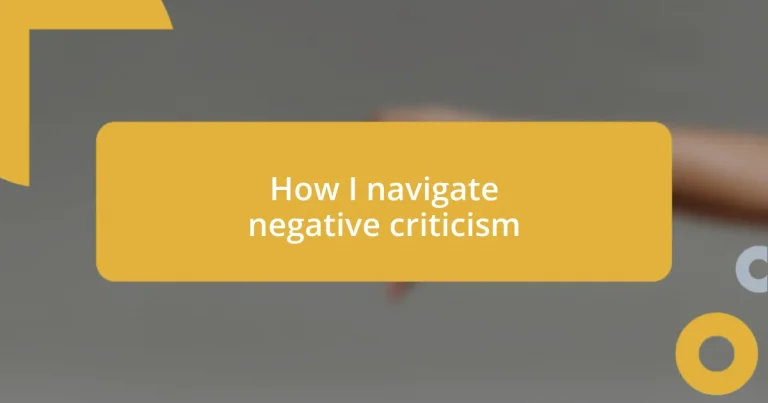Key takeaways:
- Understanding criticism as subjective allows for personal growth; viewing feedback as a learning opportunity transforms negative experiences into pathways for improvement.
- Recognizing personal triggers helps manage emotional responses to criticism, enabling a more constructive approach to processing feedback.
- Building resilience against negativity through reflection, support networks, and actionable steps fosters a growth mindset and enhances overall performance.
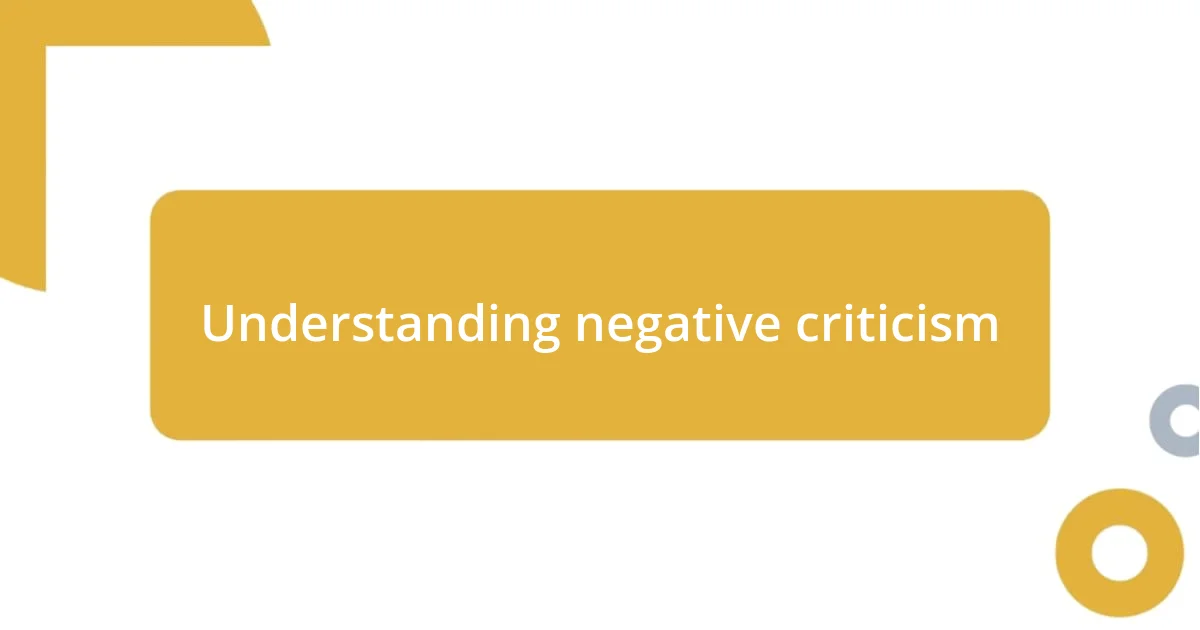
Understanding negative criticism
Negative criticism often feels like a punch to the gut, doesn’t it? I’ve had moments where I’ve poured my heart into a project, only to face harsh feedback that seemed to overshadow the effort I put in. It’s in these times that I remind myself—criticism can be a reflection of someone’s perspective rather than an absolute truth.
When I received feedback on a writing piece I was particularly proud of, I noticed my initial reaction was to defend my work. But after taking a step back, I realized that the critic’s comments stemmed from their own experiences and expectations. This realization spun my perspective; I began to view criticism as a tool for growth rather than an attack on my abilities. Have you ever thought about what motivates someone to criticize? It often comes down to their own insecurities or desires for excellence.
Ultimately, understanding negative criticism involves recognizing its nature as subjective. It’s crucial to sift through the feedback to find constructive nuggets rather than letting the negativity cloud your confidence. I once learned to ask myself, “What can I take from this that helps my journey?” This shift in thinking not only eases the sting of criticism but opens up opportunities for learning and improvement.
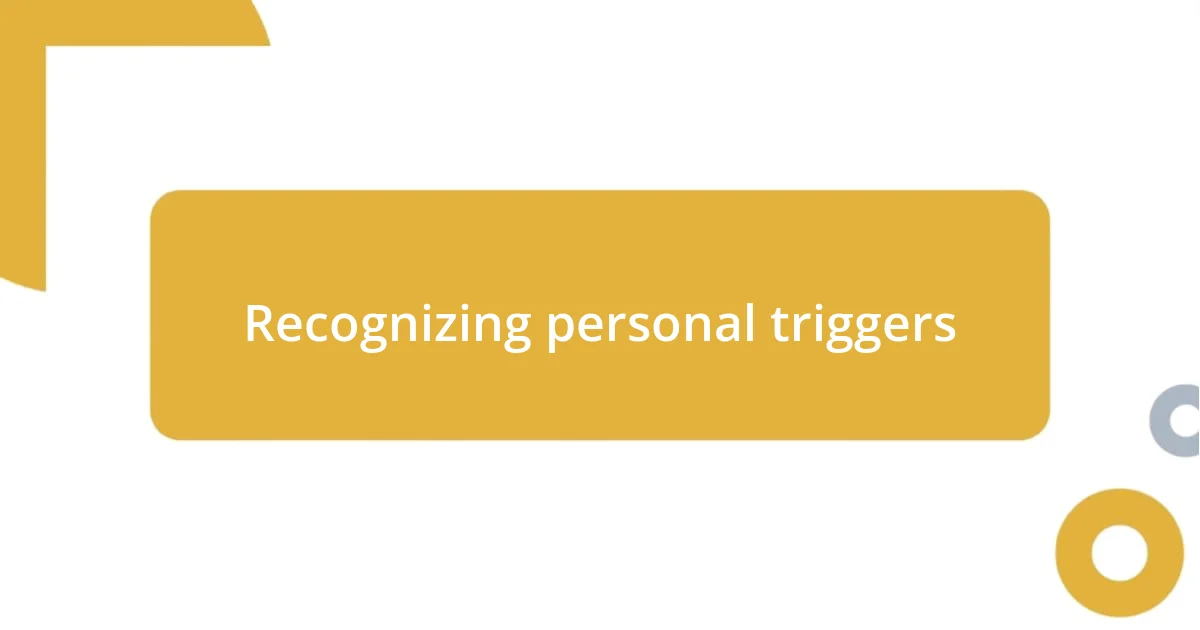
Recognizing personal triggers
Recognizing personal triggers is essential when confronting negative criticism. I’ve come to realize that certain phrases or tones particularly fuel my defensiveness. For instance, when a critic points out a ‘lack of clarity’ in my writing, it stings because clarity is something I deeply value. Acknowledging these triggers helps me to not react impulsively but to take a moment and reflect on what’s really bothering me.
To better understand your triggers, consider these reflective prompts:
- Identify specific words or phrases that evoke a strong emotional response.
- Reflect on past experiences where criticism felt especially painful—what was said?
- Take note of the situations or people that tend to trigger your defensiveness.
- Assess whether past feedback connects to deeper insecurities you hold.
- Determine if you are comparing yourself to others when reacting to criticism.
Recognizing these personal triggers allows me to process feedback more constructively, turning a potential negative experience into an opportunity for self-awareness and growth.
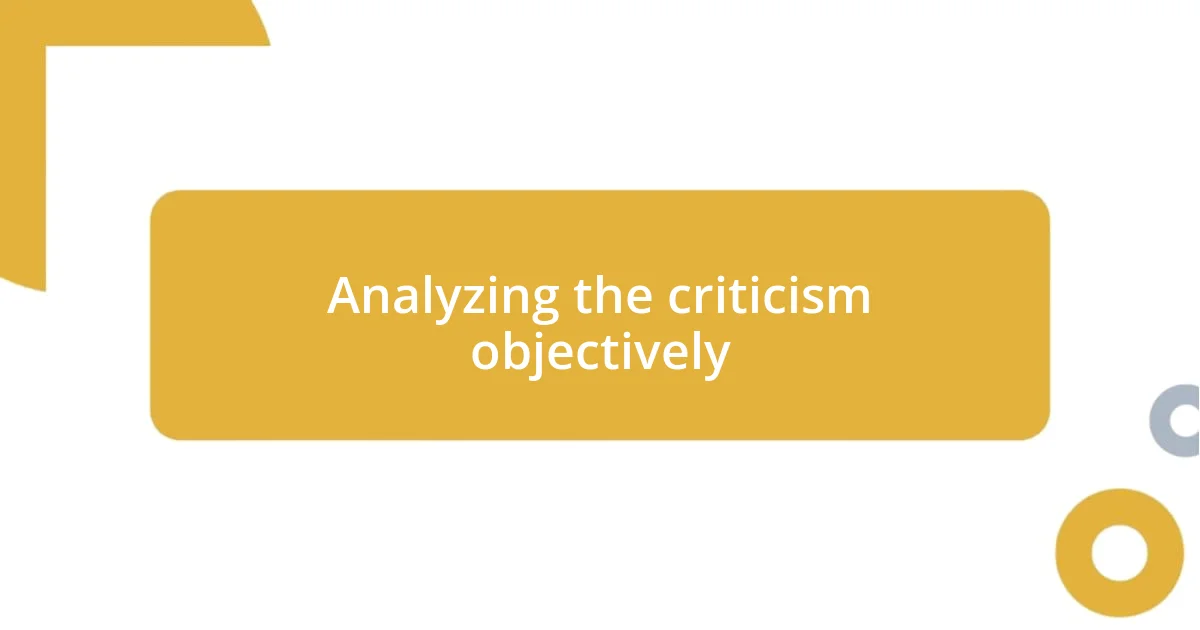
Analyzing the criticism objectively
Analyzing criticism objectively can be challenging, but it’s a skill worth developing. I remember a time when I received critical feedback on a presentation I had meticulously prepared. At first, my instinct was to dismiss it. However, when I forced myself to dissect the comments, I realized that they pointed out specific areas for improvement, like my pacing and visual aids. This shift in focus allowed me to see the feedback as a roadmap for enhancing my future presentations, rather than a reflection of my worth.
When I approach criticism with an objective lens, I often create a mental checklist. I ask myself if the feedback is actionable or valid. Was it delivered in a constructive way? Reflecting on these questions helps me filter out the noise and concentrate on what I can realistically improve. It’s like navigating through fog; the clearer the path becomes, the less daunting it feels. This method has led me to transform criticism into opportunities rather than fears.
Emotions can cloud our judgment, and I’ve found that taking a moment to breathe can make a big difference. Just the other day, a peer’s critique felt personal, yet upon reflection, I asked myself, “What aspect of this feedback can I change?” That little pause allowed me to engage with the feedback without getting defensive. It’s a simple yet powerful tool for processing any criticism objectively.
| Aspect | Subjective Response | Objective Analysis |
|---|---|---|
| Initial Reaction | Defensiveness | Curiosity about the feedback |
| Emotional Weight | Personal feelings attached | Detached review of facts |
| Value of Feedback | Perception of failure | Opportunity for growth |
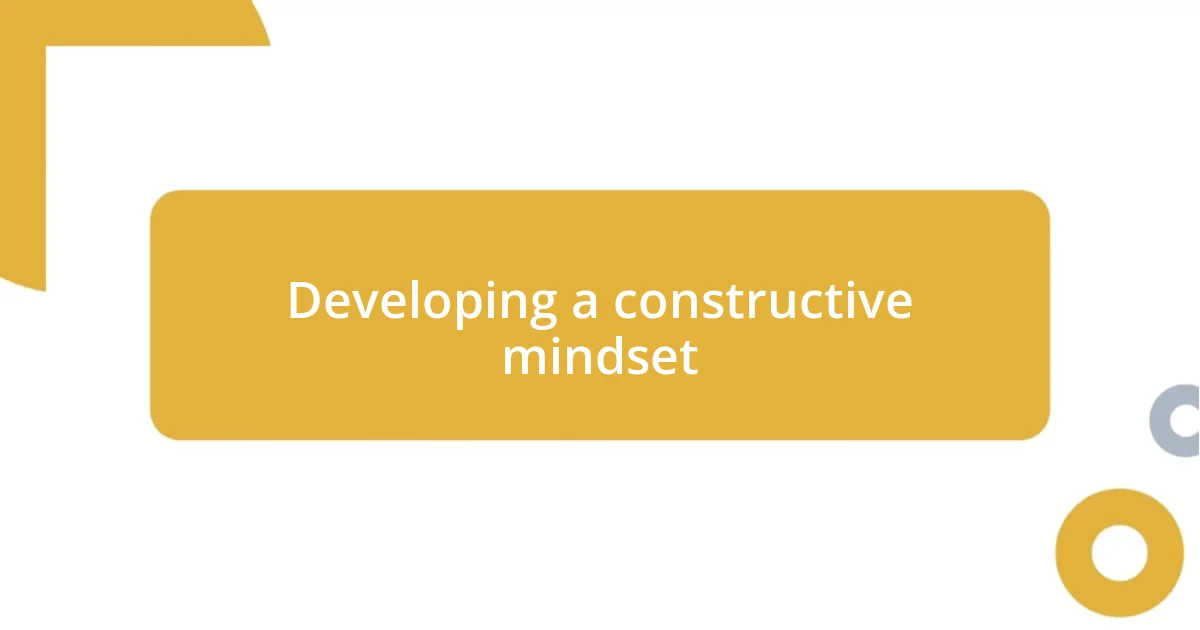
Developing a constructive mindset
Developing a constructive mindset is a journey that involves reframing how we perceive feedback. I remember a time when a colleague criticized my project management skills, and my first instinct was to defend myself. But instead, I paused and asked, “What can I learn from this?” This not only helped me gain perspective but also encouraged me to embrace a growth mindset, viewing criticism as a stepping stone rather than a stumbling block.
I’ve found that shifting my internal dialogue is crucial. When I encounter negative feedback, I often remind myself that it’s an opportunity to reflect and improve, not an attack on my character. For example, when a client expressed dissatisfaction with my design choices, I initially felt a wave of self-doubt. Then, I reframed it: “What insights can this provide?” This perspective shift transformed my frustration into motivation to explore new design principles.
Looking back, it’s fascinating how a constructive mindset can influence our growth. Have you ever noticed how resilience builds with each piece of constructive criticism you embrace? I certainly have. With each interaction, I learn more about my strengths and areas for growth, turning what once felt like a personal affront into a pathway for development. This realization has made me genuinely grateful for feedback, no matter how it’s delivered.
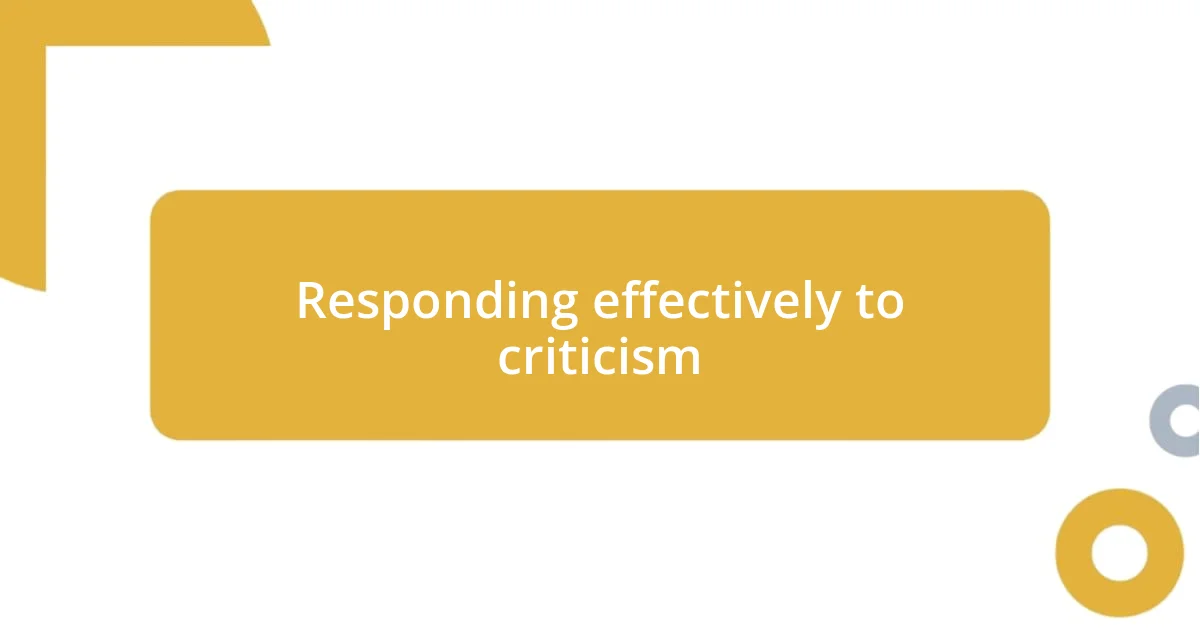
Responding effectively to criticism
When I receive criticism, I’ve discovered that my immediate reaction can often set the tone for how I respond. I remember a particularly tough session where my supervisor pointed out multiple flaws in my report. Instead of getting defensive, I took a deep breath and said, “Thank you for highlighting these areas.” This simple acknowledgment transformed the atmosphere, allowing for a productive discussion that led to meaningful improvements. Isn’t it interesting how a shift in response can change the entire conversation?
Crafting a thoughtful reply is essential. I recall a time when a colleague critiqued my approach to a team project. Initially, my gut reaction was to justify my decisions passionately, but I paused and asked, “What specific changes could elevate our project?” This question opened the door to collaboration, and we ended up merging ideas that enriched the final outcome. Have you ever tried turning a defensive stance into curiosity in your discussions? It might just lead to valuable insights you hadn’t considered before.
Ultimately, I’ve learned to view criticism as a chance for dialogue rather than an attack. Once, after presenting a new idea that was met with skepticism, I chose to invite further thoughts rather than retreating. By saying, “I really appreciate your feedback; what are your suggestions for improvement?” I found not only gained clarity but also strengthened my relationship with my peers. Isn’t it rewarding when criticism turns into an opportunity to learn from one another?
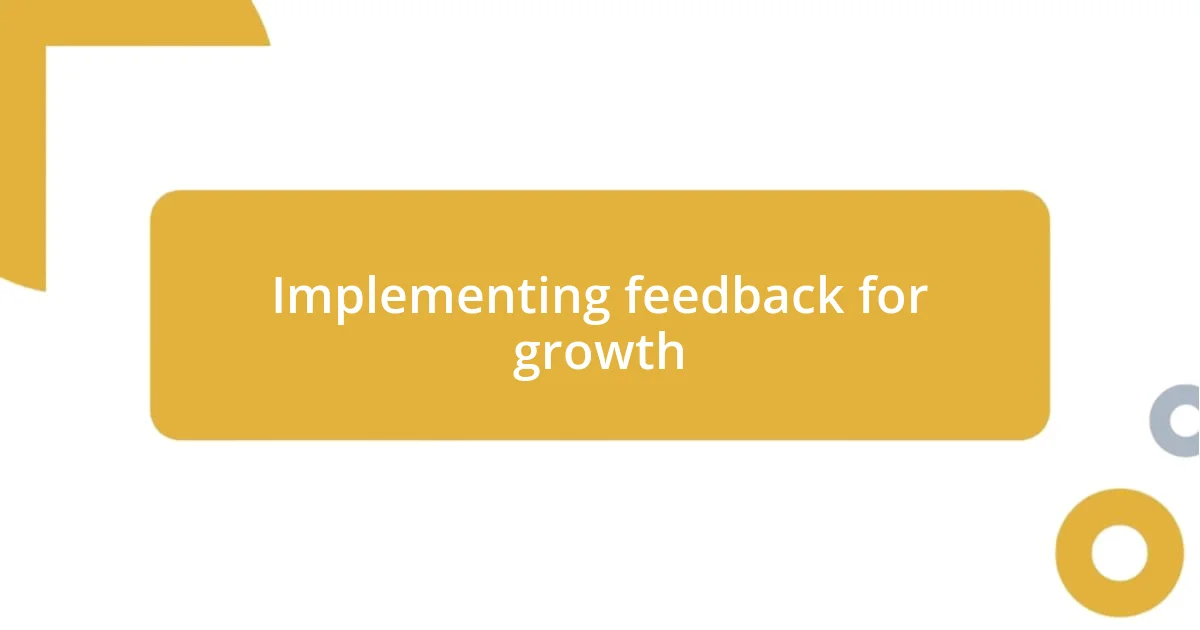
Implementing feedback for growth
Implementing feedback for growth involves a proactive approach that transforms constructive criticism into actionable steps. I remember one project where my team leader highlighted multiple areas needing improvement in my analysis report. Instead of feeling disheartened, I took those notes and created a checklist. This not only helped me refine the current project but also served as a guideline for similar tasks in the future. Have you ever thought about how a simple checklist could organize your thoughts and enhance your performance?
Another time, after receiving feedback from a mentor who suggested I improve my public speaking skills, I enrolled in a workshop designed to develop that very skill. The experience was eye-opening; I not only honed my abilities but also gained a supportive network of peers who shared their own stories of growth. Initially, the thought of stepping out of my comfort zone was daunting, but embracing that feedback turned into an inspiring journey. How has stepping out of your comfort zone led to personal growth in your life?
I’ve found that documenting feedback can be a game-changer. Reflecting on criticism through journaling allows me to track my progress over time. For instance, during a performance review, my supervisor noted my tendency to rush through details. By jotting down this feedback and revisiting it, I developed a more measured approach in my work. It’s incredible to see how addressing even small suggestions can lead to significant improvements. Have you ever felt like small tweaks made a huge difference in your professional journey?
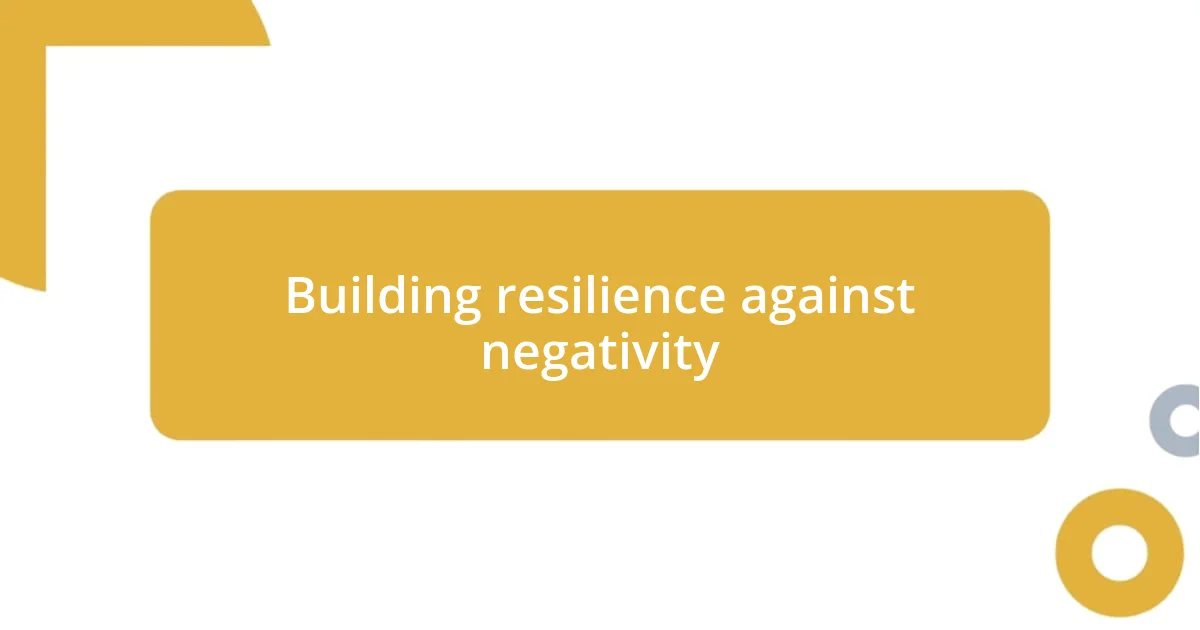
Building resilience against negativity
Building resilience against negativity has been a transformative journey for me. I remember a time when a simple comment from a friend left me feeling disheartened. Rather than dwelling on it, I decided to dive deep into what triggered such a strong reaction. I realized that my sensitivity to criticism stemmed from insecurities I hadn’t fully addressed. By recognizing this, I took steps to confront those feelings directly, and it genuinely changed how I perceived negativity.
Another experience that stands out is when I faced relentless criticism in a project review. At first, it stung, and I felt like a deflated balloon. However, I decided to reframe my mindset; instead of seeing those critiques as personal attacks, I began to view them as stepping stones to growth. Each piece of feedback became a lesson waiting to be learned. Isn’t it empowering to think that we can turn the tide on negativity by reshaping our perspective?
Moreover, I’ve found that building a support system is crucial in weathering the storm of negativity. Surrounding myself with positive influences has helped me cultivate resilience. When faced with harsh feedback, I often reach out to friends who understand my journey. Their encouragement provides a necessary counterbalance to the negative voices. Have you ever leaned on your support network when faced with discouragement? It’s a reminder that we don’t have to navigate this path alone.











